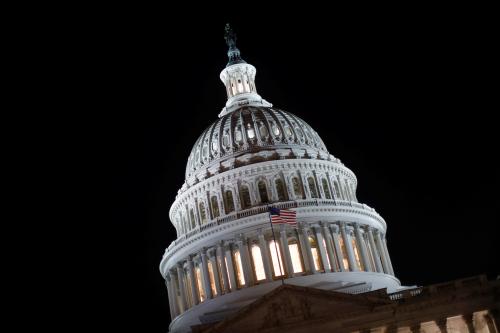This interview originally appeared on NPR on January 21, 2018.
The federal government has been in a partial shutdown for two days. NPR’s Michel Martin talked to Brookings Senior Fellow David Wessel about the economic impact of shutdown.
MICHEL MARTIN, HOST:
We’re going to turn now from the politics of the government shutdown to the economics of it. In just a few minutes, we’ll hear from a federal employee who would like to be able to go to work tomorrow but might not be able to. But first, we want to talk about the cost of a government shutdown, so we called David Wessel. He is director of the Hutchins Center on Fiscal and Monetary Policy at the Brookings Institution. That’s a centrist research institution here in Washington, D.C., and he was nice enough to let us call him at home. David Wessel, thank you so much for joining us.
DAVID WESSEL: Good to be with you, Michel.
MARTIN: So we’re hearing that it actually costs money to shut the government down, which seems counter-intuitive on some level. So first, is that true? And if it is, why does it cost money?
WESSEL: Well, it is true. Of course, there’s a lot of time spent getting ready for a shutdown – just like if you have a vacation house and you shut it down for the winter, you have to turn off the water to the pipes. The federal government is a huge machine, and if you want to stop it in mid-action, it – you have to spend time turning the dials and figuring out who works and making sure that the right people are working and the right ones aren’t. And I found a Government Accountability Office report from 1990, which if you adjusted for inflation, says that if the shutdown is three weekdays, it costs $80 million in administrative costs and $320 million in lost revenue to the government.
MARTIN: So those are actual hard costs. Are there economic impacts that go beyond the actual apparatus of the government?
WESSEL: Yes. Of course, the biggest impact is on the federal employees themselves. Even those people who are required to work will not get paid in real time. In the past, Congress has always said, well, we’ll pay you later. That may happen this time. We don’t know. But then if you look beyond that, there are government services that are not being provided. You can’t sell an airplane, for instance. You can’t get a question answered at the Internal Revenue Service. There are all sorts of services that people can’t get. The economists who add this up say it works out to about $2 billion a week in lost output to the economy every day the shutdown persists.
MARTIN: Now what if this is resolved before Monday, when most people go to work? I mean, obviously, all kinds of people work throughout the weekend. But let’s assume, just for the sake of argument, that the bulk of the workforce works that normal Monday-through-Friday schedule. If they somehow manage to figure all this out today before most people go to work, does the same thing apply?
WESSEL: No, it’s basically a blip. It’s unfortunate. It’s disruptive, but it won’t make much difference. It matters if this thing persists, particularly if it persists through February 1 when the next payday comes.
MARTIN: The last time the government shut down was 2013. So presumably, you know, we know what there is to know from that experience. Do you think that the same factors will apply or is there anything different about this that would cause us to have a different outcome?
WESSEL: Well, one thing is that the Trump administration has allowed more people to go to work and allowed more things to happen. The national parks are apparently open. They just don’t have staff. So that would mute the effect. But basically, economists estimate that it’ll shave about a tenth of a percentage point off of growth of GDP each week the government’s closed – $2 billion a week. I don’t see any reason why that should be any different than it was in 2013.
MARTIN: Before we let you go, David, do you have any sort of international comparison here? Is there any other developed economy – a peer economy of the United States – that has experienced this kind of disruption to government operations in the last – I don’t know – whatever time frame you want to pick – five years or 10 years?
WESSEL: I think the answer is no. This is a case of American exceptionalism.
MARTIN: That’s David Wessel. He’s director of the Hutchins Center on Fiscal and Monetary Policy at the Brookings Institution. David, thanks so much for speaking with us.
WESSEL: You’re welcome.
The Brookings Institution is committed to quality, independence, and impact.
We are supported by a diverse array of funders. In line with our values and policies, each Brookings publication represents the sole views of its author(s).





Commentary
The economic impact of a government shutdown
January 22, 2018